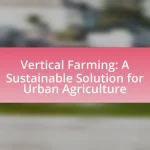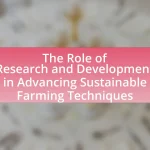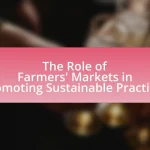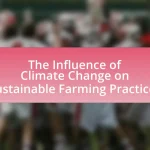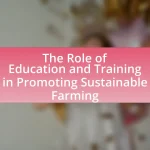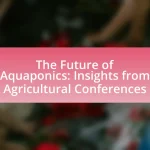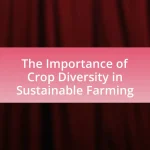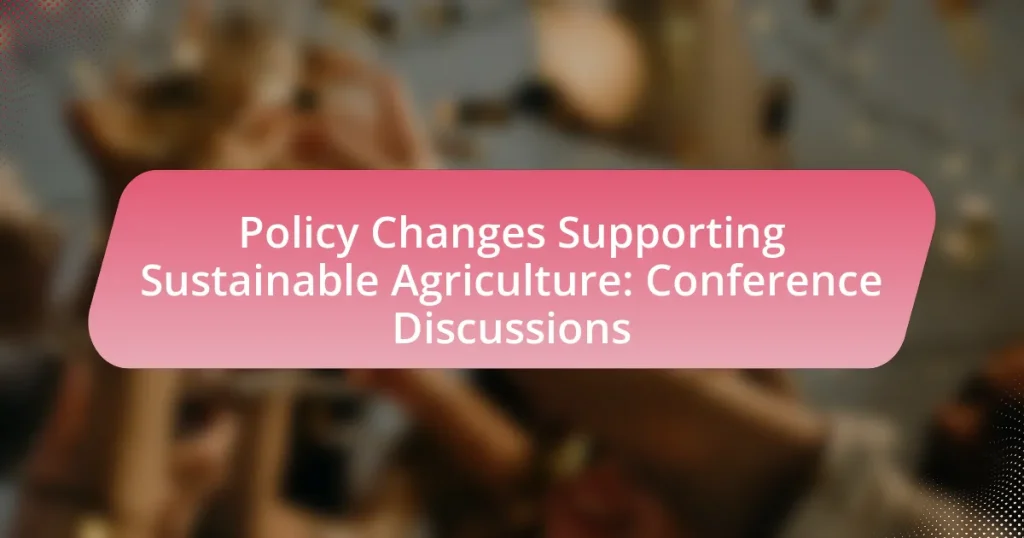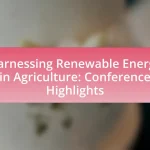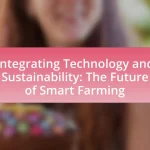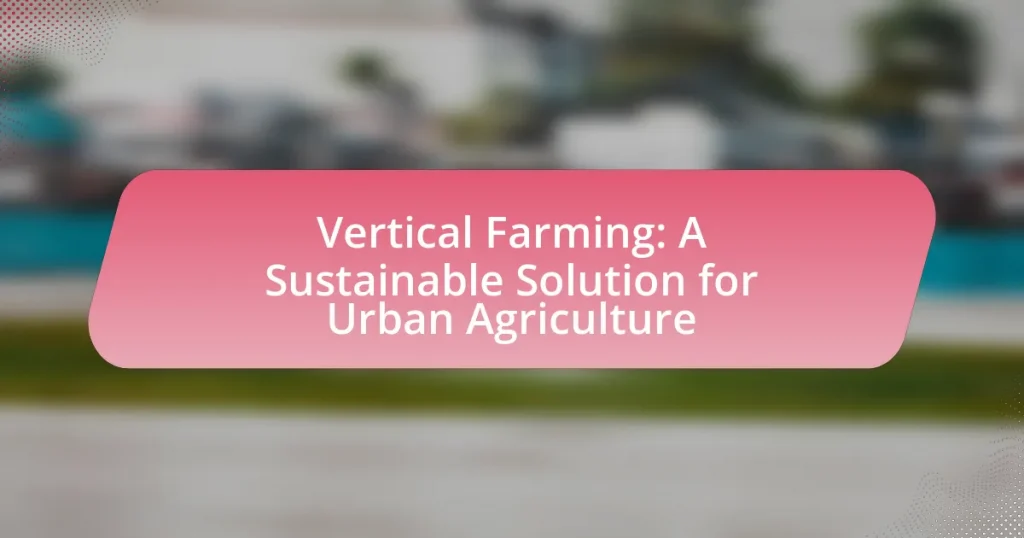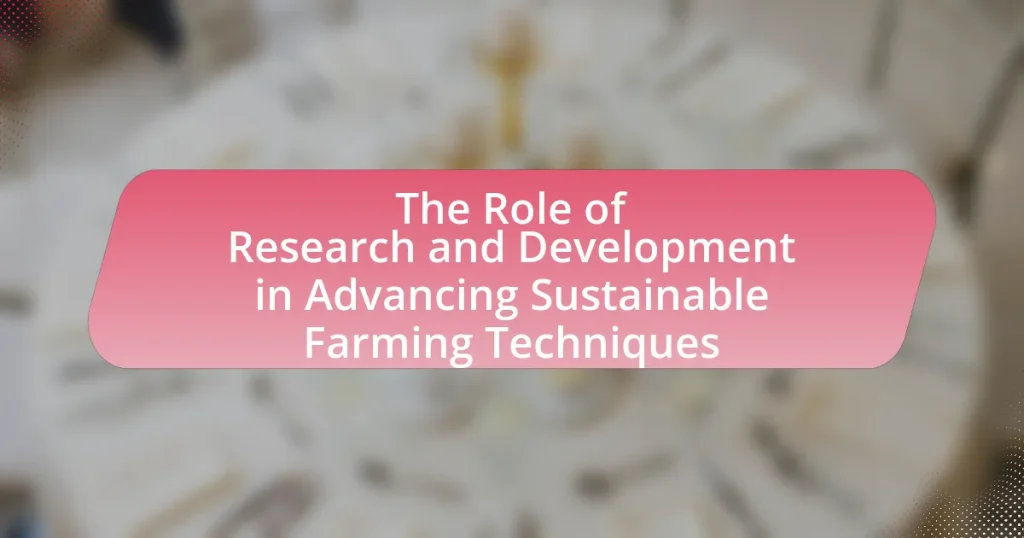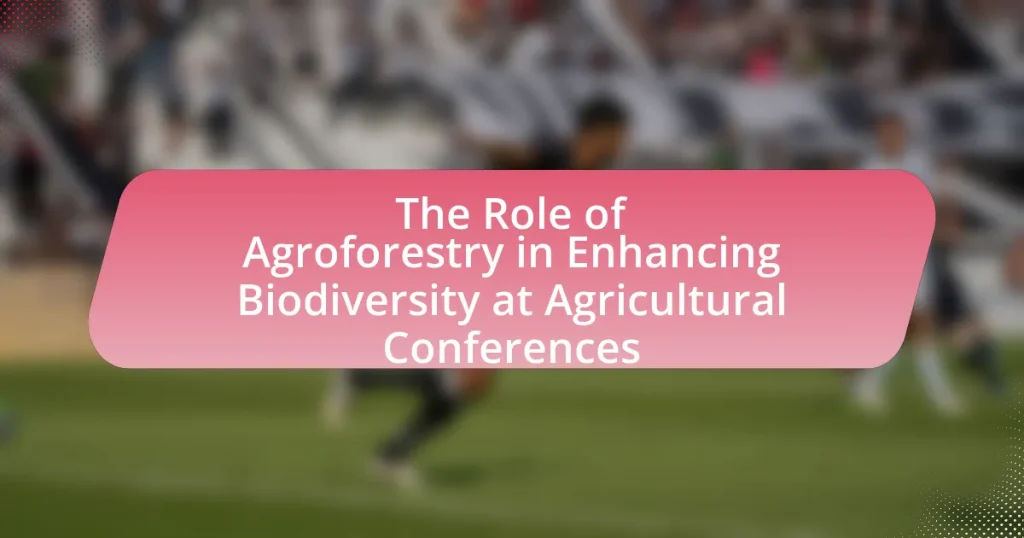The article focuses on key policy changes that support sustainable agriculture, highlighting the implementation of subsidies for organic farming, regulations promoting agroecological practices, and incentives for reducing greenhouse gas emissions. It discusses the impact of these policies on agricultural practices, encouraging methods such as crop rotation and organic farming, which enhance soil health and biodiversity. Additionally, the article examines the role of conferences in shaping these policies, detailing how stakeholder discussions influence policy development and the integration of best practices. It also addresses the challenges faced by sustainable agriculture without supportive policies and outlines future trends, including the adoption of emerging technologies and data-driven decision-making.
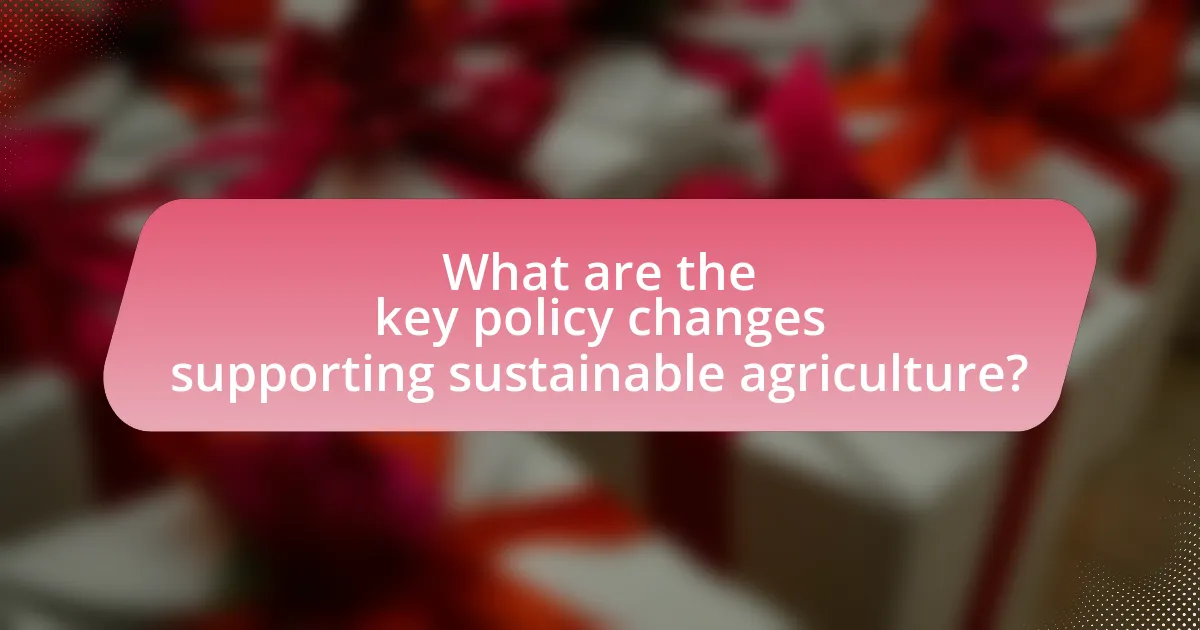
What are the key policy changes supporting sustainable agriculture?
Key policy changes supporting sustainable agriculture include the implementation of subsidies for organic farming, regulations promoting agroecological practices, and incentives for reducing greenhouse gas emissions in agriculture. These policies aim to enhance environmental sustainability, improve soil health, and promote biodiversity. For instance, the European Union’s Common Agricultural Policy has shifted towards supporting environmentally friendly practices, allocating approximately 30% of its budget to eco-schemes that encourage sustainable farming methods. Additionally, the U.S. Department of Agriculture has introduced programs that provide financial assistance to farmers adopting conservation practices, demonstrating a commitment to sustainable agricultural development.
How do these policy changes impact agricultural practices?
Policy changes supporting sustainable agriculture significantly impact agricultural practices by promoting environmentally friendly methods and incentivizing resource conservation. These changes often include regulations that encourage the adoption of practices such as crop rotation, reduced pesticide use, and organic farming. For instance, the implementation of subsidies for farmers who adopt sustainable practices has been shown to increase the adoption rate of such methods, leading to improved soil health and biodiversity. Additionally, policies that mandate reduced greenhouse gas emissions from agricultural activities compel farmers to innovate and implement more efficient practices, ultimately resulting in a more sustainable agricultural sector.
What specific practices are encouraged by these policies?
The specific practices encouraged by these policies include crop rotation, integrated pest management, and organic farming techniques. Crop rotation enhances soil health and reduces pest and disease pressure, while integrated pest management minimizes chemical use by employing biological control methods. Organic farming techniques promote biodiversity and soil conservation, aligning with sustainable agriculture goals. These practices are supported by research indicating that they improve environmental outcomes and agricultural productivity, thereby validating their effectiveness in fostering sustainable agricultural systems.
How do these practices contribute to sustainability?
Sustainable agriculture practices contribute to sustainability by enhancing environmental health, promoting economic viability, and fostering social equity. These practices, such as crop rotation, organic farming, and agroforestry, reduce soil erosion, improve biodiversity, and decrease reliance on chemical inputs, which leads to healthier ecosystems. For instance, a study published in the journal “Agriculture, Ecosystems & Environment” found that organic farming can increase soil organic matter by 20-30%, thereby improving soil fertility and carbon sequestration. Additionally, sustainable practices often lead to increased profitability for farmers, as they can reduce input costs and access premium markets for organic products. This economic benefit supports rural communities and promotes social equity by providing fair wages and working conditions.
Why are these policy changes necessary for sustainable agriculture?
Policy changes are necessary for sustainable agriculture to address environmental degradation, enhance food security, and promote economic viability. These changes facilitate the adoption of practices that reduce greenhouse gas emissions, conserve water, and protect biodiversity. For instance, implementing regulations that incentivize organic farming can lead to improved soil health and reduced chemical runoff, which are critical for long-term agricultural sustainability. Additionally, policies that support research and development in sustainable technologies can increase crop resilience to climate change, ensuring stable food supplies.
What challenges does sustainable agriculture face without these policies?
Sustainable agriculture faces significant challenges without supportive policies, including financial instability, lack of access to resources, and inadequate market incentives. Financial instability arises as farmers may struggle to invest in sustainable practices without government subsidies or grants, leading to reliance on conventional methods that can harm the environment. Additionally, without policies promoting access to sustainable technologies and practices, farmers may lack the necessary tools and knowledge to implement effective sustainable methods. Market incentives, such as price premiums for sustainably produced goods, are often absent, making it difficult for farmers to compete with cheaper, non-sustainable products. These challenges hinder the overall adoption of sustainable agriculture practices, ultimately affecting food security and environmental health.
How do these policies address environmental concerns?
These policies address environmental concerns by promoting sustainable agricultural practices that reduce pollution and conserve natural resources. For instance, they encourage the use of organic farming techniques, which minimize chemical runoff into waterways, thereby protecting aquatic ecosystems. Additionally, policies may include incentives for farmers to adopt crop rotation and cover cropping, which enhance soil health and reduce erosion. Research indicates that implementing these practices can lead to a significant decrease in greenhouse gas emissions, with studies showing that sustainable agriculture can reduce emissions by up to 30% compared to conventional methods.
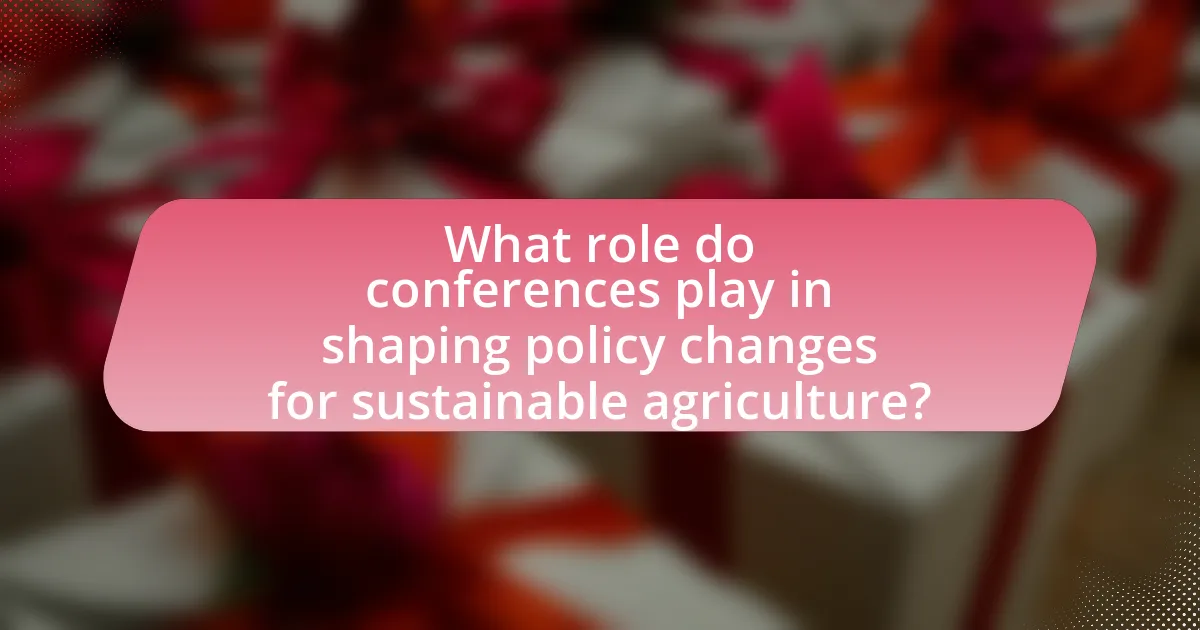
What role do conferences play in shaping policy changes for sustainable agriculture?
Conferences play a crucial role in shaping policy changes for sustainable agriculture by facilitating dialogue among stakeholders, including policymakers, researchers, and practitioners. These events provide a platform for sharing research findings, best practices, and innovative solutions, which can influence policy decisions. For instance, the Food and Agriculture Organization (FAO) has reported that international conferences often lead to the establishment of frameworks and guidelines that countries adopt to enhance sustainable agricultural practices. Additionally, conferences can mobilize funding and resources, as seen in the Global Forum for Food and Agriculture, which has successfully aligned public and private sector interests towards sustainable agricultural policies.
How do conference discussions influence policy development?
Conference discussions significantly influence policy development by facilitating dialogue among stakeholders, including policymakers, researchers, and practitioners. These discussions provide a platform for sharing evidence-based practices, innovative ideas, and diverse perspectives, which can shape policy agendas. For instance, the outcomes of the 2019 UN Climate Action Summit led to the adoption of new commitments by various countries to enhance sustainable agricultural practices, demonstrating how collective discussions can drive policy changes. Furthermore, research indicates that conferences often result in actionable recommendations that are later integrated into national and international policy frameworks, thereby reinforcing the connection between dialogue and policy formulation.
What stakeholders are typically involved in these discussions?
The stakeholders typically involved in discussions about policy changes supporting sustainable agriculture include government agencies, agricultural producers, environmental organizations, academic researchers, and community representatives. Government agencies play a crucial role in formulating and implementing policies, while agricultural producers provide insights into practical challenges and needs. Environmental organizations advocate for sustainable practices and conservation efforts, and academic researchers contribute evidence-based knowledge and innovations. Community representatives ensure that local perspectives and needs are considered in policy development. These stakeholders collectively influence the direction and effectiveness of sustainable agriculture policies.
How is feedback from conferences integrated into policy proposals?
Feedback from conferences is integrated into policy proposals through systematic collection, analysis, and incorporation of participant insights and recommendations. Conference organizers typically gather feedback via surveys, discussions, and workshops, which are then analyzed to identify key themes and actionable items. For instance, the United Nations Food and Agriculture Organization (FAO) often utilizes feedback from its conferences to shape agricultural policies, ensuring that stakeholder perspectives are reflected in the proposals. This process not only enhances the relevance of the policies but also fosters stakeholder engagement and support, ultimately leading to more effective implementation of sustainable agriculture initiatives.
What are the outcomes of recent conferences focused on sustainable agriculture?
Recent conferences focused on sustainable agriculture have resulted in significant policy recommendations aimed at enhancing environmental sustainability and food security. For instance, the 2023 Global Conference on Sustainable Agriculture emphasized the need for governments to adopt agroecological practices, which can reduce chemical inputs by up to 50% and improve soil health. Additionally, the conferences highlighted the importance of integrating climate resilience into agricultural policies, with studies indicating that such measures could increase crop yields by 20% in vulnerable regions. These outcomes reflect a growing consensus among stakeholders on the necessity of collaborative efforts to address the challenges posed by climate change and resource depletion in agriculture.
What specific policies were proposed or revised during these conferences?
During the conferences focused on sustainable agriculture, specific policies proposed included the implementation of carbon farming incentives, revisions to subsidy structures to favor environmentally friendly practices, and the establishment of stricter regulations on pesticide use. These policies aim to promote sustainable farming techniques, reduce greenhouse gas emissions, and enhance biodiversity. For instance, the carbon farming incentives are designed to financially reward farmers who adopt practices that sequester carbon in the soil, thereby directly addressing climate change.
How have these outcomes been received by the agricultural community?
The agricultural community has generally received the outcomes of the policy changes supporting sustainable agriculture positively. Many farmers and agricultural organizations have expressed support for initiatives that promote environmentally friendly practices, as these changes align with their long-term interests in sustainability and profitability. For instance, a survey conducted by the American Farm Bureau Federation indicated that 70% of farmers believe that sustainable practices can enhance their productivity while also benefiting the environment. This positive reception is further evidenced by increased participation in programs aimed at implementing these policies, demonstrating a commitment to adapting to new agricultural standards.
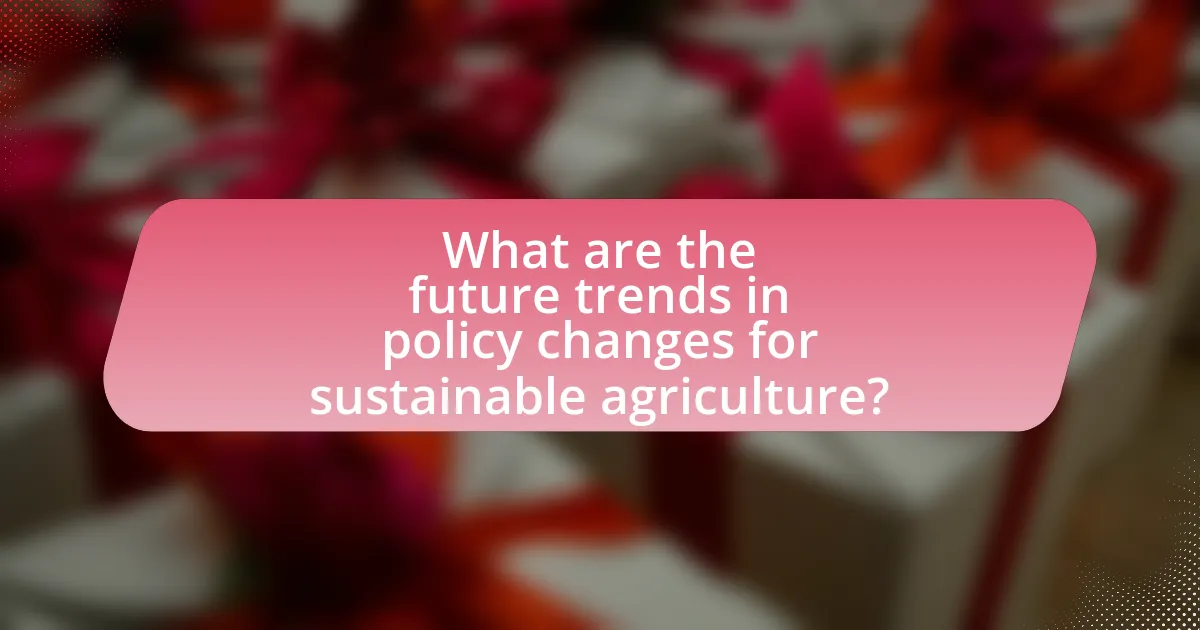
What are the future trends in policy changes for sustainable agriculture?
Future trends in policy changes for sustainable agriculture include increased emphasis on climate resilience, enhanced support for agroecological practices, and integration of technology in farming. Policymakers are recognizing the need to adapt agricultural practices to mitigate climate change impacts, as evidenced by the growing number of countries committing to carbon-neutral goals by 2050. Additionally, the adoption of agroecological practices is being promoted through financial incentives and subsidies, reflecting findings from the Food and Agriculture Organization that highlight their benefits for biodiversity and soil health. Furthermore, the integration of precision agriculture technologies is being encouraged to optimize resource use and reduce waste, supported by research from the International Food Policy Research Institute showing that such technologies can significantly increase crop yields while minimizing environmental impact.
How might emerging technologies influence future policies?
Emerging technologies will significantly influence future policies by enabling data-driven decision-making and enhancing efficiency in agricultural practices. For instance, precision agriculture technologies, such as drones and IoT sensors, provide real-time data on crop health and soil conditions, allowing policymakers to create targeted interventions that promote sustainable practices. A study by the Food and Agriculture Organization highlights that the adoption of such technologies can lead to a 20-30% increase in crop yields while reducing resource use, thereby informing policies that support sustainable agriculture initiatives.
What role does data play in shaping these future policies?
Data plays a crucial role in shaping future policies by providing evidence-based insights that inform decision-making processes. In the context of sustainable agriculture, data on crop yields, soil health, and environmental impacts enables policymakers to develop targeted strategies that promote sustainability. For instance, studies have shown that data analytics can identify best practices in resource management, leading to policies that enhance productivity while minimizing ecological footprints. Additionally, data-driven assessments of climate change effects on agriculture help in formulating adaptive policies that ensure food security and resilience in farming systems.
How can innovation drive sustainable agricultural practices?
Innovation can drive sustainable agricultural practices by introducing advanced technologies and methods that enhance efficiency and reduce environmental impact. For instance, precision agriculture utilizes data analytics and GPS technology to optimize resource use, leading to a reduction in water and fertilizer consumption by up to 30%, as reported by the USDA. Additionally, innovations such as vertical farming and hydroponics allow for food production in urban areas, minimizing transportation emissions and land use. These advancements not only improve crop yields but also promote biodiversity and soil health, aligning agricultural practices with sustainability goals.
What best practices can be adopted from conference discussions?
Best practices that can be adopted from conference discussions on policy changes supporting sustainable agriculture include fostering collaboration among stakeholders, sharing successful case studies, and implementing evidence-based strategies. Collaboration among stakeholders, such as farmers, policymakers, and researchers, enhances knowledge exchange and promotes innovative solutions. Sharing successful case studies provides practical examples that can inspire and guide others in implementing sustainable practices. Evidence-based strategies, supported by data and research findings, ensure that policies are effective and grounded in real-world applications, leading to better outcomes for sustainable agriculture initiatives.
How can stakeholders effectively implement these best practices?
Stakeholders can effectively implement best practices in sustainable agriculture by establishing collaborative frameworks that engage all relevant parties, including farmers, policymakers, and researchers. This collaboration ensures that diverse perspectives are integrated into the decision-making process, leading to more comprehensive and effective strategies. For instance, the Food and Agriculture Organization (FAO) emphasizes the importance of multi-stakeholder partnerships in achieving sustainable development goals, highlighting that such collaborations can enhance resource sharing and innovation. Additionally, stakeholders should prioritize education and training programs to equip farmers with the necessary skills and knowledge to adopt sustainable practices, as evidenced by successful initiatives in various countries that have led to increased productivity and environmental benefits.
What resources are available to support the adoption of these practices?
Resources available to support the adoption of sustainable agriculture practices include government grants, technical assistance programs, and educational workshops. Government grants, such as those provided by the USDA, offer financial support for farmers transitioning to sustainable methods. Technical assistance programs, often facilitated by agricultural extension services, provide expert guidance on implementing sustainable practices effectively. Educational workshops, organized by agricultural organizations and universities, equip farmers with knowledge and skills necessary for sustainable farming. These resources collectively enhance the capacity of farmers to adopt and maintain sustainable agricultural practices.
